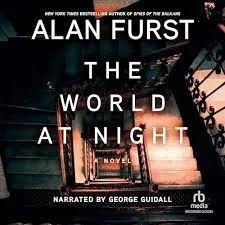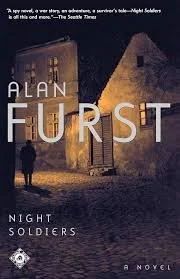The World At Night
As I drive down the road listening to Alan Furst’s “The World At Night,” I am frequently struck by how fine is Furst’s prose. It sounds at times more like poetry. And, occasionally and unexpectedly, I laugh out loud. This is not an overtly humorous novel; the humor catches you by surprise, especially when listening as opposed to reading. This is the type of humor I like best and perhaps the hardest to write successfully. Here is an example; a bit raunchy perhaps, but I–at age 77– know of what he speaks:
Albertine tonight. His big, ugly treasure of a farm girl. Something good to eat. Vegetables, cow food–but garlic, salt, a drop of oil, and the cunning way she chopped it all up. Jesus! Was it possible that he had reached that ghastly moment in life when the belly was more important than the prick? No! Never that! Why he’d take that Albertine and spread her.
Furst’s heroes are reluctant amateurs, usually not trained by MI6, the CIA, NKVD, etc.. They are amateur spies doing what they can to defeat the enemies of their homelands, whether that be the Soviet Union, France, or an Eastern European country. “The World At Night” begins on May 10, 1940, the day that Nazi Germany invades France, Holland, and Belgium. The protagonist, Jean-Claude Casson, is a movie producer, not a spy. After being called up to film the war and being demobilized when France quickly capitulates, he returns to Paris and his life as a producer with no thought of resisting the Nazis or becoming a spy. He is recruited for British intelligence by an acquaintance who has already been helping the British. Here he is on the cusp of becoming an amateur agent working for the British intelligence and the French resistance:
‘Want to help’
Cason thought a moment, he didn’t really know what to say. He did want to help. Left to himself, he would never have done anything, just gone on trying to live his life as best he could. But he hadn’t been left to himself, so now, he had to decide if he wanted to become involved in something like this.
Yes, he said to himself. But it was what they called un petite oui, a little yes. Not that he was afraid of the Germans–he was afraid of them, but that wouldn’t stop him–he was afraid of not being any good at it.
He eventually says yes.
Jean-Claude is a lover of Paris and all things Parisian, especially the women of Paris.
For the best he thought. He walked down Marbeuf and turned onto the Champs Elysées. At twilight the city throbbed with life, crowds moving along the avenue, the smells of garlic and frying oil and cologne and Gauloises and the chestnut blossom on the spring breeze all blended together. The cafés glowed with golden light, people at the outdoor tables gazing hypnotized by the passing parade. To Casson, every face–beautiful, ruined, venal, innocent–had to be watched until it disappeared from sight. It was his life, the best part of his life; the night, the street, the crowd. There would always be wars, but the people around him had a strength, an indomitable spirit. ‘They cannot be conquered,’ he thought. His heart swelled. He’d made love all his life–his father had taken him to a brothel at the age of twelve–but this, a Paris evening, the fading light, was his love affair with the world.
“The World At Night” and its sequel, “Red Gold,” are part of the Night Soldiers series, espionage novels of World War II and the years of the 1930s leading up to the war. The fifteen books in the series take place in various locations across Europe, ranging from France and Spain east into the Soviet Union. The protagonists are French, Polish, Bulgarian, Hungarian, Soviet, and Greek who owe their allegiance to various countries, but all resisting and fighting the Nazis. More than just espionage books, his novels have been “widely acclaimed for their literary quality, historical accuracy, and immersive storytelling.” And, he “is the king of the brooding atmospheric eastern european espionage story.” **
I entered Furst’s world through the first book in the series, “Night Soldiers.” The book begins in Bulgaria where the protagonist, Khristo Stoisnew, is recruited by the NKVD, the Soviet Union’s secret service. He journeys to Spain to participate in the Spanish Civil War. He washes up in Paris after fleeing Stalin’s purges of the late 1930s. He joins the French Resistance in World War II. Throughout, he is driven by hatred of the Nazis who murdered his brother.
I’ll end this review with a passage in which Casson remembers his relationship with an old flame (he has many, and he remains friendly with them all). I like the sentiments expressed.
They’d never disagreed about the big things. They like eccentricity, people who lost themselves in the study of plants or bugs. They liked people with big hearts. They wanted to hear that in the end it all turned out for the best.
** spylibrary.com, “Spy Readers Guide to the books of Alan Furst:”, 01/21/25

